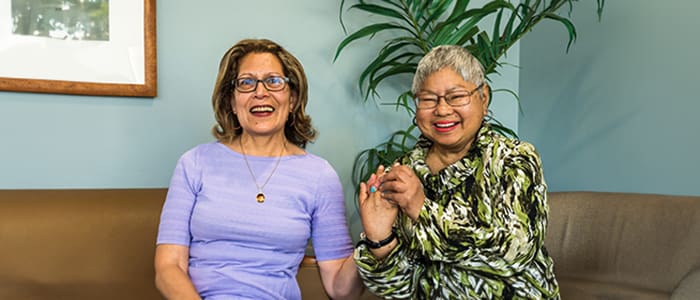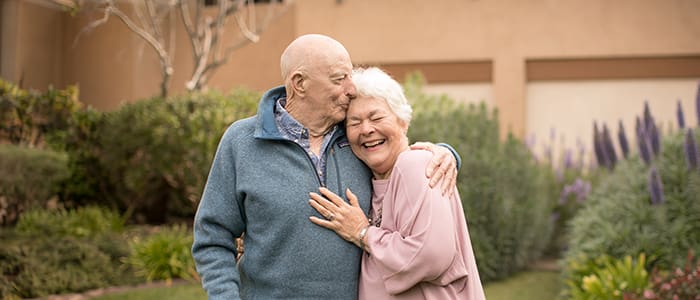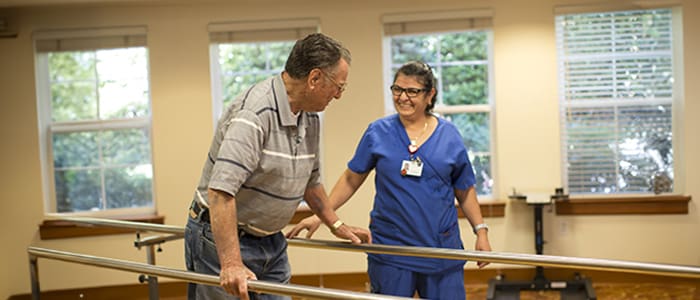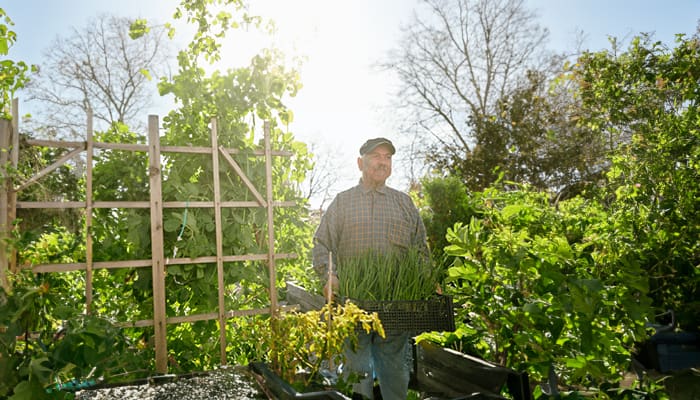March 1, 2021
Profile of John Woodward
Covia and Front Porch are uniting as one organization in an affiliation that is expected to take place on April 1, 2021. John Woodward, who has been CEO of Front Porch since 2015, will become the CEO of the combined organization following the close of the affiliation. Prior to joining Front Porch, John was an investment banker and advisor to not-for-profit organizations. He has an MBA from the University of Chicago Graduate School of Business with a specialization in Hospital Administration.
Recently, Laura Darling, Covia’s VP of Communications and Spiritual Care, sat down with John to talk about the affiliation and his vision for Front Porch after the affiliation. The interview has been edited for clarity.
LD: It’s great to get to learn more about you! What do you want people to know about you that isn’t included on your resume?
JW: Like most kids in the rural community where I grew up, I had the usual assortment of odd jobs mowing lawns and house painting. I received my first official paycheck as a summer worker in a sawmill near where I grew up in North Idaho. After college graduation, I moved to San Francisco where I volunteered in a free clinic as an intake worker, interviewing walk-in clients. It was in this volunteer role that I first recognized the value of listening. To this day, I strive to become a better listener of those we serve.
LD: Along with your days in the sawmill, we know a little bit about your professional background. But what is it that brought you to senior living? And why have you stayed?
JW: I was fortunate to work with a wide range of not-for-profit organizations including academic medical centers and rural health clinics, mental health providers and organizations serving the developmentally disabled. I also advised senior living organizations on green field development as well as expansion and renovation programs. It was these relationships that provided the opportunity for the consolidation of the predecessor organizations that formed Front Porch.
When I was approached about my current position, I was very familiar with Front Porch since I was part of the team that helped with the mergers as well as financing. But my perspective had been from the outside and did not involve day-to-day responsibilities. An opportunity to actually work with many of the people who I had known for many years, was really exciting.
One reason I have stayed in senior living is that I learned just how interesting and exciting it is to work with both the residents and our employees. Early on another person on our management team told me that he considered it a privilege to work for our residents. And that stuck with me: it is an incredible privilege to support these amazing people.
We have a very simple objective which is to do our best to support our current residents and prepare for future residents. If we do not work directly in the communities, we need to do our best to support the people who do, because the residents rely on them directly. If we do this, everything will else be fine.
LD: How would you describe your management style?
JW: I’ve observed a lot of different management styles and governance structures and formed my opinions about which ones are the most effective. For me, the most important ingredients to management are teamwork and collaboration. I believe that good ideas come from many different and often unexpected places. If you don’t collaborate and don’t have teamwork, you will often miss out on the best ideas. It’s also more fun to work as a team. And if you’re going to work hard, you better have some fun along the way!
The other lesson I’ve learned is the power of listening. Strategy doesn’t have to come just from ideas that roll around in your own head. If you listen to the people you serve and listen to the people you work with, strategy will often emerge from those conversations.
LD: Tell me a little bit about what’s special about Front Porch. What do you want Covia to know about Front Porch as an organization?
JW: I think what characterizes Front Porch is that it comes from a culture of change. The organization started with the merger of Pacific Homes with FACT [Foundation to Assist California Teachers] and California Lutheran Homes. Several year later, Sunny View, a community in Cupertino, became the fourth organization to join Front Porch.
If I had to point to an enduring influence, it would be the Pacific Homes board. Pacific Homes filed for bankruptcy protection in 1977 and was reorganized in 1981. As part of the reorganization, the trustee insisted on the appointment of board members with significant business experience. In 1992, the court approved a settlement with the prior residents and a reduction in the obligation to the Methodist Church that permitted a recapitalization in 1993. The operating performance steadily strengthened over the next decade, which set the stage for the subsequent mergers. While the board members have changed over the years, I believe that that emphasis on financial stewardship as well as commitment to mission continues.
The Covia and Front Porch boards seem to share many of the same perspectives. Neither board is willing to accept business as usual. Neither organization is complacent about the risks, and the need to change in order to respond to future needs.
Covia’s President and CEO, Kevin Gerber, has really been outstanding in his vision of the future. And it’s been a privilege to work with him and the Covia board.
LD: What have you learned so far about Covia as an organization, and how do you plan to get to know Covia better?
JW: While I have not been able to personally meet many Covia residents or employees, I look forward to an opportunity to expand my relationships. I have observed the passion, commitment and engagement of both employees and the residents. They’re very much like Front Porch residents and employees, and I look forward to the opportunity to listen, learn, and enjoy the perspective of the people we serve.
LD: I know that some people have wondered and worried if Covia will lose its character or if the individual communities will lose their individual character. Can you talk a little bit about that?
JW: Covia and Front Porch share a commitment to supporting the individual characteristics of the communities, just as we support the individual needs of our residents. We believe that the unique characteristics of each community provide a tremendous advantage to our organizations. This approach also reflects our commitment to allowing residents to define their lives and their needs.
For-profit companies developed many of the new Senior Living communities during the last decade. Our not-for-profit status gives us certain tax advantages, but ultimately we must compete on the basis of our facilities, service and pricing. I believe that not-for-profit status is an opportunity to provide more to both our residents and employees but requires careful oversight. We have an obligation to use this advantage efficiently and remain aligned with our mission and long term goals.
If we were a for-profit entity, this transition that we’re going through now might have been done much sooner. It would have been, “Okay, let’s true up the book. You get X dollars and we get Y assets and we’re done.” But what we’ve done instead of truing up the books, we’ve trued up the values. We’ve been asking each other, “So what do you believe in? How are we going to operate the future?” And that’s really the key.
LD: Along with being mission-driven and efficient as a business, what values do you hope the new organization will share?
JW: My immediate priority is to support collaboration at all levels. We want everyone to “own strategy.” We expect them to lead and to speak out when they see things that we can do better.
One of the common characteristics of both organizations is that we embrace change. We believe that there’s a responsibility to innovate, to not accept business as usual. No organization has a monopoly on good ideas and together we can come up with better strategies.
But collaboration requires connection. And so I’m hoping people can connect, if not in person, then virtually. We have worked diligently to collaborate virtually during the last year but I personally look forward to some in-person meetings.
I also think it’s vital that we retain the integrity that each organization has established over its history. I am hopeful that we can develop trust throughout the entire organization to allow effective teamwork.
LD: What excites you about this affiliation?
JW: As much as each organization has accomplished to date. I think the potential to do so much more is reflected in the new organization that we are building. As we go forward, I expect the energy to build with our combined teams. The possibilities are limitless.
LD: Here’s my last question: COVID permitting, when do you think we might be able to see you in person?
JW: My best day is when I visit a community, and I seek opportunities to visit as often as possible. I intend to visit all of the Covia communities as soon as the public health protocols permit. Whether it’s standing in front of a group of several hundred or having coffee with one or two people, it is an opportunity to learn from residents and employees.
Going forward, I plan to split my time between Northern and Southern California, so I hope to visit all of our communities on a regular basis. This not a big change for me personally since I have commuted between Glendale and San Francisco since joining Front Porch. I have lived in San Francisco for over 40 years, so I’m counting on BART returning to full service soon so I can get to the Walnut Creek office!






